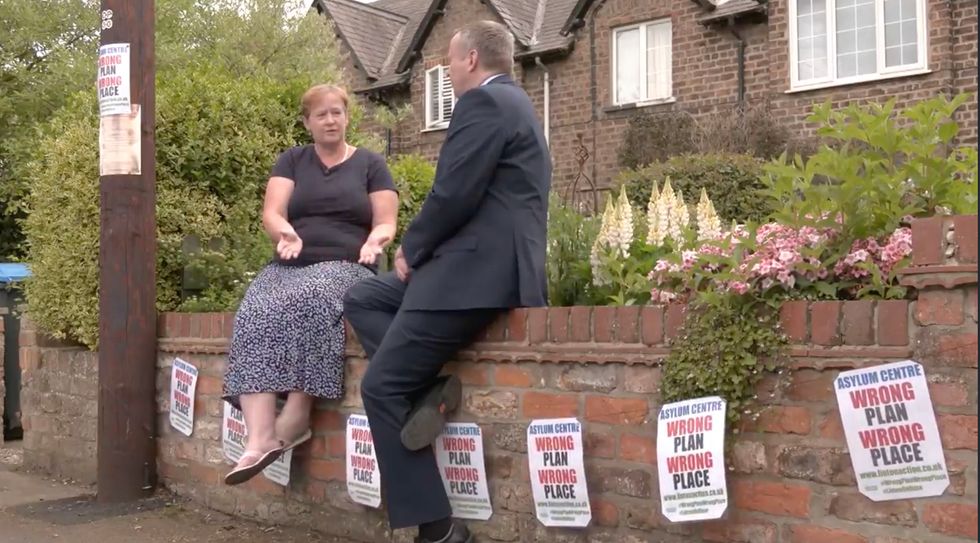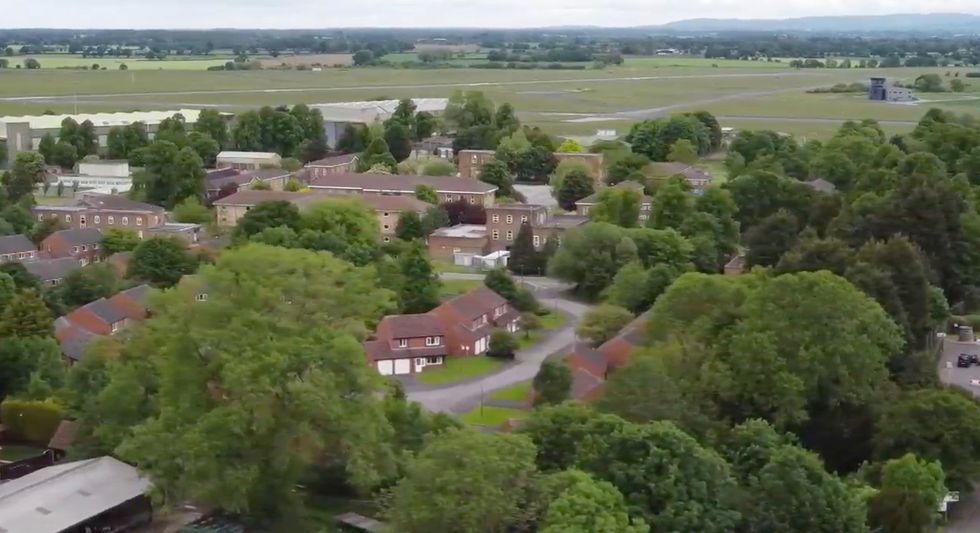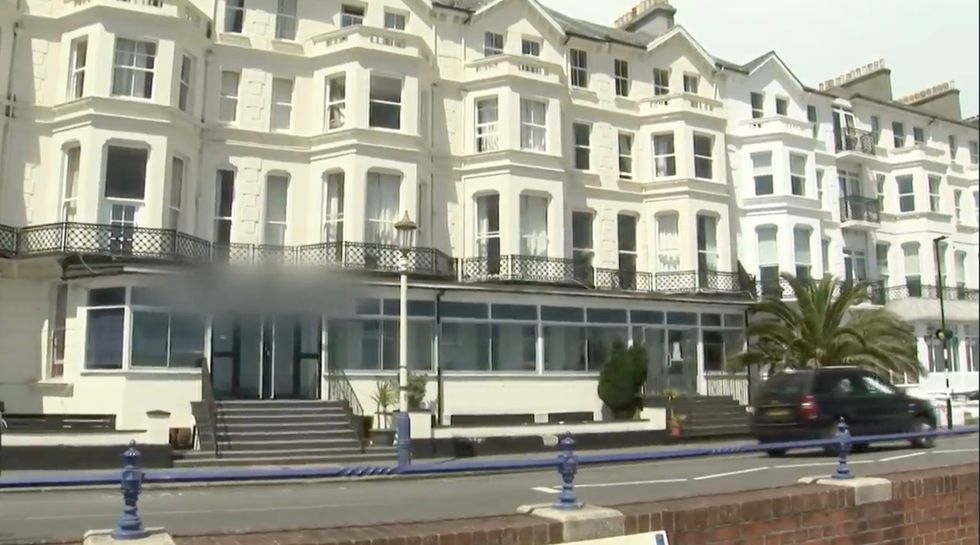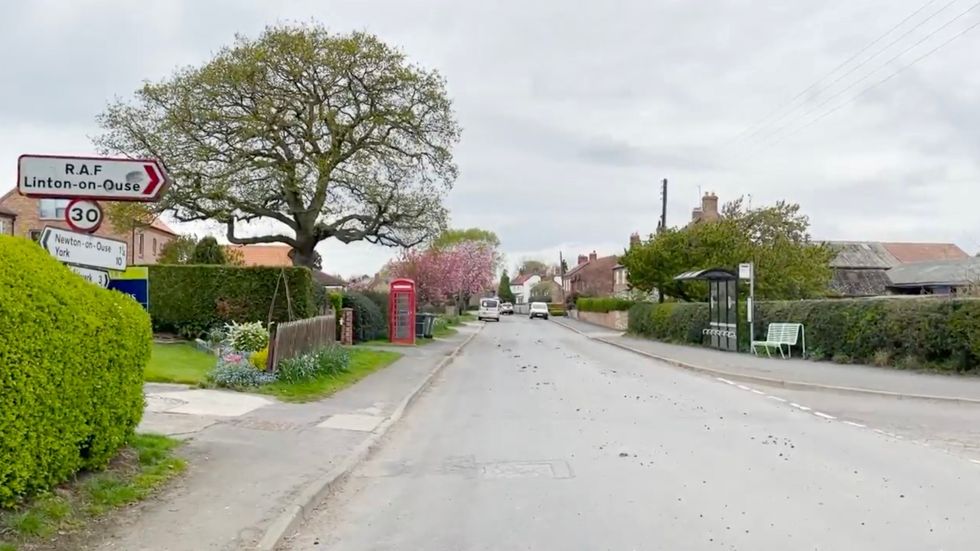Home Office using 30,000 hotel rooms across UK to house refugees, GB News can reveal

The Home Office could use other MOD sites for refugees if it makes a success of the Linton-on-Ouse facility
Don't Miss
Most Read
Up to 30,000 hotel rooms across the UK are being requisitioned by the Home Office every day to house asylum seekers, as they wait for their claims to be processed, GB News can reveal.
A total of 37,000 asylum seekers are currently in hotel accommodation, at a cost to the UK taxpayer of almost £5 million a day.
As the Government acknowledges the increasing reliance on hotels is "unsustainable" the first of around 1,500 asylum seekers are expected to arrive at a former RAF base in North Yorkshire this week.
The controversial move, which has enraged local people in the nearby village of Linton-on-Ouse, is part of a package of measures to help tackle the growing asylum seekers accommodation crisis and reduce the need for costly hotels.
Despite significant protests by Linton-on-Ouse villagers, the first 60 asylum seekers, all single young men, will be bused to the base in the next few days.
If the Home Office can make a success of the Linton-on-Ouse facility, it could pave the way for the use of other former Ministry of Defence and government sites for similar accommodation centres in the months ahead.
Kathryn Dryden has lived in Linton-on-Ouse for six years.
Mark White speaks to residents of Linton-on-Ouse
GB News
She told GB News that villagers are angry at the lack of any meaningful consultation between the Home Office and local people.
Linton-on-Ouse camp
GB News
She said: "The biggest concern really is the numbers of people that will be coming.
"I have no issue with asylum seekers. I have no issue supporting a specific number of asylum seekers.
"The issue is the numbers of people that will be coming that will outnumber the village population by nearly three to one. Now that can't be right."
A Home Office spokesman said: “The unprecedented and unacceptable rise in dangerous small boat crossings continues to put huge pressure on the UK’s broken asylum system.
Aerial footage of Linton-on-Ouse
GB News
“As part of the New Plan for Immigration, we are reducing the current almost £5 million daily cost of using hotels to accommodate migrants through the new asylum reception centre at Linton-on-Ouse and by creating a fairer asylum dispersal system.”
The Home Office also said it “Will use a phased approach to developing Linton-on-Ouse, gradually increasing the number of asylum seekers accommodated at the site over the coming weeks."
GB News travelled to Eastbourne in East Sussex, where asylum seekers are currently being housed in a number of hotels near the seafront.
We have agreed with a Home Office request not to name the hotels, because of potential safety concerns.
But all of the hotels requisitioned by the Home Office are now closed to the general public, and anyone trying book a room is referred to the booking agent, or to the Home Office.
Eastbourne seafront
GB News
John Northfield tried to book a hotel near Bristol airport recently, but was told the hotel was no longer taking outside bookings.
“I was hoping to stay just for one night before I headed off to Tenerife in the morning.” He said.
“I just got an email back telling me unfortunately that my booking had been cancelled, no explanation of why I've been cancelled.
“They just said the hotel was going to be closing down for 12 months.
“I was just a bit peeved that they didn't actually give me an explanation of why the hotel was being closed for 12 months.
"And obviously lots of people around the country, trying to book hotels, are facing similar problems."
In Eastbourne, the asylum seekers in hotels there are free to come go, but the issue is a sensitive one for the Home Office.
Mark White speaks to asylum seekers in Eastbourne
GB News
As we tried to interview a couple of young Iranian men outside the front of one hotel, a government minder told us we were not allowed to speak to them, before agreeing we could talk to them.
In broken English, the two men told us they were Iranian Kurds and both aged 27.
However, they would not say how they arrived in the UK.
The issue of how best to house asylum seekers across the UK is a constant and growing headache for the Home Office.
On 13 April, all local authorities in England, Scotland and Wales became an asylum dispersal area by default.
This will require all local authorities to make more council housing stock and private rented accommodation available in their areas for the asylum seeker dispersal programme.
But the issue of integrating large groups of mainly young men in communities across the country remains controversial after several concerning incidents in recent months.
Thames Valley Police confirmed officers are currently investigating an incident in a park in Windsor in recent days, where a group of school girls were reportedly approached by two young male asylum seekers.
One of the girls videoed the encounter on her smartphone, as the men asked the girls for personal details, even after being told they were just 15 years old.
In Linton-on-Ouse, Dr Olga Matthias, who has helped lead the campaign against the asylum seekers centre there, said she feared the plan could "end in disaster."
Linton-on-Ouse
GB News
"I think it's quite definite that something will go wrong in the weeks and months ahead."
She said. "The Home Office has no track record of successfully delivering any policy that they've invented, and I use the word invented deliberately because this is definitely not been thought through.
"It's almost back of the fag packet policy, so everything they touch is a disaster. It's a failing department.
"It has been failing for 40 years and that's been a slow trajectory, but I think we're at the tipping point now where this is about to catapult into catastrophe. Something appalling, or several appalling, some things will happen."
Of particular concern, is the lack of facilities for asylum seekers within the village of Linton-on-Ouse, which has one local shop on the main street, and no other amenities.
Addressing those concerns, the Home Office said: "Linton-on-Ouse is being designed to be as self-sufficient as possible, minimising any impact on local communities, services, and the need to leave the site.
"This includes providing full-board accommodation and on-site recreation, exercise, a shop, faith and worship and medical facilities will be available."
Kathryn Dryden said: "We've seen from other communities, either in hotels or on bases, wherever they've been, that they do mix in the communities and hang about in the communities.
“What are these people going to do? They’ll have no money, so what they're actually going to be able to do is minimal.
“Most will stay around the village and they’re going to be bored out of their skulls.”
The need to adapt former military installations and to requisition more council housing stock and hotel accommodation will only continue to grow, as long as the thousands continue to come across the English Channel in small boats.
The government’s plan to send some asylum seekers to Rwanda has not properly begun yet, and is likely to be stuck in multiple legal challenges for some months to come.
There is no way of knowing yet what deterrent effect, if any, that policy will have.
In the meantime, the number of people arriving on small boats continues to grow at a higher rate than last year, which saw 28,526 people cross the Channel.
So far, this year, despite several spells of unfavourable weather of late, almost 10,000 people have paid criminal gangs to take them across the Channel in small boats.

















